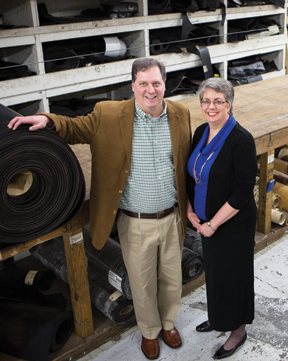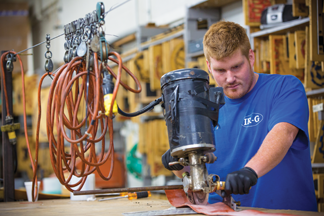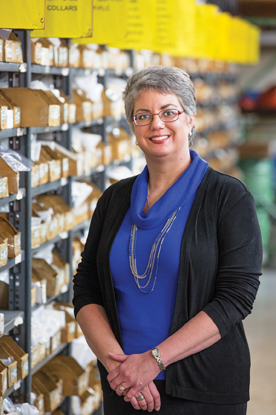Making toast
Nashville-based IR-G embraces lean practices to improve performance
 |
|
Mark Fournier and his sister, Donna Nock, are the second-generation owners of the business founded by George and Joyce Fournier. |
By Rich Vurva
If you hear employees at IR-G, the Nashville-based hose and accessories distributor, talk about making toast, it’s not because they’re hungry. They’re referring to a popular “Toast Kaizen” video that explains lean manufacturing and continuous improvement concepts. Every new IR-G employee watches the video that demonstrates how to notice and eliminate waste in processes even as simple as making toast.
The objective is to remove unnecessary steps in a manufacturing, assembly, warehousing or administrative process that cost a business time and money.
Multiple examples throughout IR-G’s facility demonstrate how employees have taken the concept to heart. For example, a reel attached to a shelf in the assembly area keeps strapping material close at hand and eliminates a safety hazard. The air ventilation hose added to a cut-off saw improved air quality in the shop, and a yellow light on the switch lets employees know when the fan is running. Netting hanging from the ceiling holds an assortment of pre-assembled boxes within easy reach for shipping orders of every shape and size. A buzzer on the water jet that’s used to cut gaskets sounds an alarm to alert the machine operator when the job is complete.
Each of these ideas, and many more, came from employee suggestions.
“Every quarter, we ask employees to share their job improvement ideas with us,” explains Mark Fournier, IR-G president. “They’re often very simple ideas that cost little or nothing to implement, but they make people’s jobs easier and make us more productive in the process.”
Trusting employees to come up with job improvement suggestions stems from the company’s decades-old mission statement, which expresses a belief in “taking care of our employees first, our suppliers second, and our customers third.”
“When our employees and suppliers are treated well, we believe that our customers will be treated exceptionally well,” Fournier says.
Fournier is the majority owner of the privately held Nashville company formerly known as Industrial Rubber & Gasket. Along with his sister, Donna Nock, he is in the process of acquiring IR-G from his parents, George and Joyce Fournier, who bought the business out of bankruptcy court in 1989. George Fournier remains active as CEO and Joyce Fournier remains as treasurer.
 The company, which is approaching $10 million in annual sales, now has five locations in three states, selling industrial and hydraulic hose, gaskets, sheet material and sealing products and services.
The company, which is approaching $10 million in annual sales, now has five locations in three states, selling industrial and hydraulic hose, gaskets, sheet material and sealing products and services.
Customers include Tier 1 and Tier 2 suppliers to the automotive industry from the Nashville headquarters location and from Cookeville and Clarksville, Tenn., branches. Local steel mills comprise the largest customer base for the Blytheville, Ark., location. The newest branch opened in December 2013 in Decatur, Ala., and will focus on a diverse base of industrial and construction customers.
“We’re in the process of increasing our regional footprint. We want to be the premier distributor in the Mid-South and have a big enough reach to take care of everybody in this region,” Fournier says.
Moving fast
The decision to open a fifth branch demonstrated Fournier’s willingness to move quickly to seize a business opportunity.
In September, while speaking with a supplier of mechanical seals about introducing a new product line, Fournier met a salesman from the Decatur area who previously worked in distributor sales. The salesman’s job was recently eliminated as part of a restructuring when his company was acquired by another distributor. Fournier was impressed by the salesman’s industry knowledge. They began speaking about the potential to grow sales in northern Alabama, which was a region that the salesman believed was being under served after his previous employer had been sold. Following further discussion and planning, Fournier offered the salesman a job and also hired the former operations manager from the company that had been acquired and put them in charge of the new Decatur branch.
He also timed the move to take advantage of changes in Section 179 IRS tax rules for deducting depreciable assets in one year. In 2013, small businesses could expense up to $500,000 in business related investments such as computers, business equipment and machinery. That limit is scheduled to drop to $25,000 in 2014.
Establishing a new branch by the end of 2013 made sense from a business standpoint and also helped reduce IR-G’s tax exposure. The ability to write off major start-up expenses helped cover the costs of industrial and hydraulic hose crimpers, gasket cutters, saws, shelves, racking and other items needed to start doing business from the new 5,000 square foot facility.
“There have been a couple of stressful nights but we know what we are doing since we have opened new branches in the past,” Fournier says. If the Decatur location follows the path of other branch launches, he anticipates that it will be profitable by the end of 2014.
IR-G offers a profit sharing program to reward employees at the end of each month when the business is profitable.
“The dollar amount can vary, by years of service to the company and by job responsibility, but everyone gets some share of the profits,” explains Nock, the company’s vice president. Employees also can earn a monthly bonus when team goals are met. “Our people refer to it as ‘big check Friday’ when they receive the bonus and profit sharing contributions,” Nock says.
 |
|
Donna Nock earned a master of Industrial Distribution degree before joining the family business full-time. |
Nock joined the company in 2009 after completing a Master of Industrial Distribution degree from Texas A&M University. While earning the degree, she also returned periodically to Nashville to learn the business from the ground up and to participate in meetings with a consultant with expertise in business succession planning. The family met with the consultant as a group and individually over a two-year period to discuss transitioning the business from its founders to the second generation.
“It was very important to George and Joyce that the transition went well. They put so much into this business that they want to make sure it succeeds,” Nock says. She acknowledges that her parents had ample opportunities to sell their business to outside acquirers that have been gobbling up independent industrial rubber distributors, and is grateful that they decided to keep the company family-owned.
Many employees have worked in the business for so long that they have become like family.
Like the monthly profit sharing plan and the quarterly job improvements suggestions, another key to success has been to involve employees in looking for outside-the-box thinking by fellow employees. Nock and Fournier periodically invite employees to “catch one another doing good” and compile a list of examples that they share with the staff.
Sometimes employees recount tales of a fellow employee displaying an act of kindness, such as taking a meal to a co-worker with a sick spouse or buying cleaning supplies for a fellow employee who was moving into a new house. Other examples highlight staff members who put in an extraordinary effort for a customer, like the installers who went to a customer’s location at 5 a.m. one Friday morning to install a new belt to keep a production line from going down. Another employee hopped into his vehicle and drove around the neighborhood to catch up to a UPS truck so a delivery could be shipped that day.
“The program is our way for employees to acknowledge one another and to be acknowledged by management,” Nock says.
IR-G managed a nearly 13 percent sales gain in 2013. With the new Alabama branch and a number of new construction projects in downtown Nashville that have boosted the local economy, Fournier hopes to achieve a double-digit sales increase again in 2014.
Some of the growth occurring in downtown Nashville – such as the new Music City Center convention center that opened in May 2013 just blocks away from IR-G – are transforming the look of the neighborhood. Fournier recognizes that the downtown improvements may eventually create a situation where it makes sense to relocate to a different building that’s better suited to an industrially focused business. He has begun a preliminary search for properties to purchase at the appropriate time. While a move might not happen for five years or more, he believes in being proactive. It’s Fournier’s way of making toast.
This article originally appeared in the March/April 2014 issue of Industrial Supply magazine. Copyright 2014, Direct Business Media.













